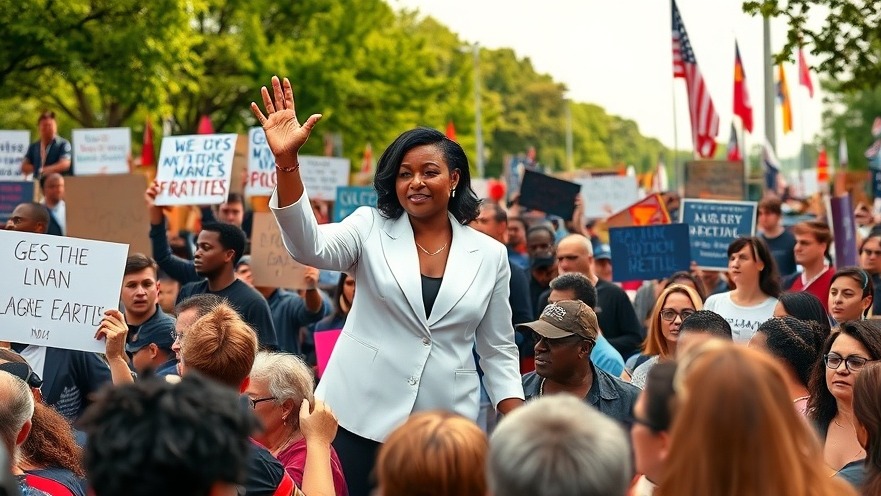
Virginia Leaders Stand Against Racism in Political Discourse
In a shocking display of racism, a sign targeting Virginia's Lt. Gov. Winsome Earle-Sears has drawn condemnation from political leaders across the state. The sign in question linked specific bathroom policies with segregation, sparking outrage among those who viewed the demonstration as not only racially charged but also fundamentally disrespectful to a public servant's efforts to protect all citizens, regardless of their gender identity. This incident has renewed discussions about racism within the sphere of political protest and the necessary boundaries of political discourse.
Context: The Background of Gender and Race in Virginia Politics
The intersection of race and gender in Virginia politics has been fraught with tension, especially as the state grapples with policies related to transgender rights and bathroom access. Winsome Earle-Sears, who made history in 2021 as the first Black female lieutenant governor in Virginia, has been at the forefront of these controversies. Her ascent into office is not just a personal victory but also a significant milestone for representation in a historically conservative state.
However, her policies often draw fierce opposition, largely due to the contentious nature of transgender rights. As the debate rages on regarding public bathroom access for transgender individuals, Earle-Sears has become a central figure in a polarized environment where attacks often shift from policy discussions to personal and racially charged assaults.
The Sign That Sparking Outrage: An Examination
During a recent protest, a sign was displayed that compared the fight for transgender bathroom access to the segregation that African Americans faced during the civil rights era. This analogizing struck a nerve not only among Earle-Sears's supporters but also among a wide array of political and community leaders who found the comparison offensive and reductive. They argue it belittles both the historical struggle against racism and the genuine complexities surrounding gender identity and rights.
Responses: A Unified Political Front
Virginia's political leaders from both sides of the aisle quickly rallied against the racially charged message communicated by the sign. In statements released via social media, prominent politicians articulated their disapproval while reaffirming their commitment to ensuring civil discourse is maintained in political activism. "Racism has no place in our political dialogue. We must stand together, regardless of our differences," proclaimed one Democratic representative, highlighting the bipartisan agreement on the unacceptable nature of such rhetoric.
The Personal Impact on Winsome Earle-Sears
For Earle-Sears, the implications of such attacks resonate deeply on a personal level. In a recent interview, she expressed her frustrations, noting how these signs and rhetoric not only target her as an individual but also threaten to undermine the progress made in civil rights discourse. She pointed out that individuals from minority backgrounds often face double standards in their public service roles, where their motives are questioned and their contributions are minimized based on their race or gender.
Future Predictions: Navigating Racial and Gender Politics
As political campaigns ramp up in Virginia, the discourse around race and gender will likely only intensify. Analysts predict that as candidates position themselves on various issues, especially concerning LGBTQ+ rights, incidents like the recent sign will recur, presenting challenges for public discourse. Experts argue that this backlash against leaders like Earle-Sears may invigorate a new coalition of voters who see the importance of liberating debate from prejudice.
Conclusion: The Call for Respectful Discourse
This incident serves as a crucial reminder that political dialogues must be rooted in respect and understanding. As leaders and citizens alike reflect on this incident, it underscores the necessity of combating racism, not just as an isolated issue, but as an integrated component of every political conversation.
Virginia's citizens are encouraged to actively engage in this ongoing conversation, fostering environments where all voices can be heard without fear of racism or personal attack. Advocating for respectful discourse and understanding can pave the way for more productive legislative efforts and community cohesion.
 Add Element
Add Element  Add Row
Add Row 



Write A Comment